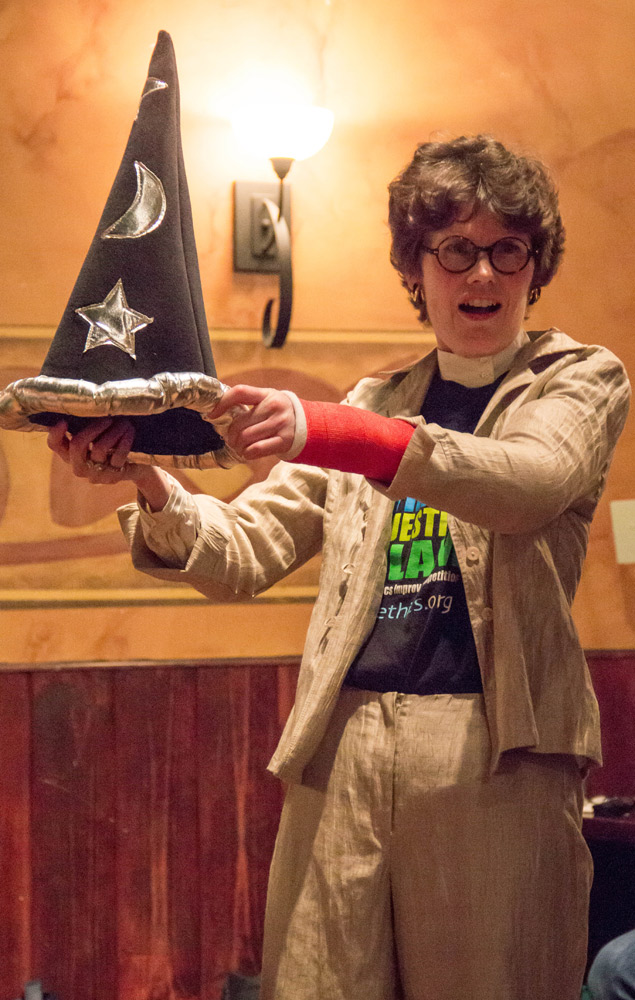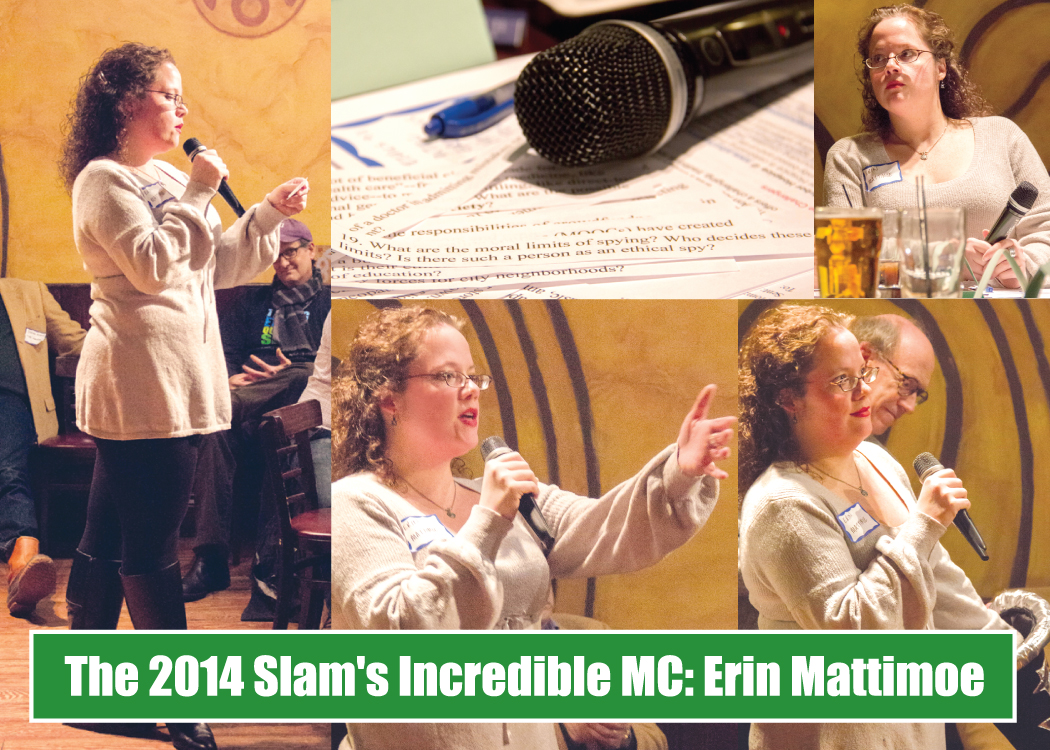2016 Slam Rules
Slam Overview
 The Slam is team-based, with no fewer than 2 but no more than 6 members to a team. It is also a judged contest: three independent judges preside over the competition, holding forth and giving frothy feedback in a traditional Irish Pub. But the Slam is no bar trivia game. Nor is it a debate or yelling match. The Slam is structured to showcase our civic-mindedness and a community sense of humor. The Slam competition is all about clear thinking, reasonable discussion and nimble observation about the many ways ethics is embedded in our public lives.
The Slam is team-based, with no fewer than 2 but no more than 6 members to a team. It is also a judged contest: three independent judges preside over the competition, holding forth and giving frothy feedback in a traditional Irish Pub. But the Slam is no bar trivia game. Nor is it a debate or yelling match. The Slam is structured to showcase our civic-mindedness and a community sense of humor. The Slam competition is all about clear thinking, reasonable discussion and nimble observation about the many ways ethics is embedded in our public lives.
The Object of the Slam
In the Slam, teams respond to selected Big Ethical Questions as best--and as ethically as they can. For teams, the principal object of the Slam is to score points, based on four common sense criteria the three judges rely on to evaluate sound arguments and ideas. The team garnering the most points from the three judges is pronounced the Slam champion. For audiences, the object of the Slam is first to support the teams. And second, to assess the quality of the various teams' responses to determine The People's Choice Award.
Question Rounds
At the beginning of the competition, each team is introduced. Team order for responding to the Big Questions and for every round is determined by drawing numbers from the Philosopher's Hat. Likewise, all of the Big Questions are placed in the same Philosopher's Hat for subsequent selection.The Slam MC draws the questions from the Hat, posing them to teams in rounds, until the final competition time is up. No team responds to the same question.
Team Time
After a question is announced, each team is given two minutes to talk over, discuss and plan their arguments and response. One person from the team is chosen as presenter for a given question, and has a maximum of two minutes to deliver the team's arguments and response to the judges and the audience. Teams may choose to have a different presenter for each question.
Judge Scoring and Pithy Feedback
After each team has made their presentation, the judges have 30 seconds to determine the points the team receives for their response in the round. Judges base their decisions on the following common sense criteria:
- Clear and systematic
- Clear identification of ethical dimensions
- Awareness of different viewpoints
- Audience appeal/message's honesty
Each judge has a scorecard and awards a maximum of 5 points for each criterion. A perfect team score in a round is 20. If the Slam goes to four rounds, a perfect team score is 80.
Judges are strongly encouraged to offer their reasons for awarding points to team responses. Judges can each provide feedback or choose among themselves who they wish to comment on a given team's responses. As the judges have only a minute to provide their commentary, pithiness and impactful, that is slammy, are the valued norms. By the end of the evening, judges will have gone through their entire pithy and slammy vocabulary.
The Big Ethical Questions
Questions for the Slam are contributed by the public and edited by members of the A2Ethics.org Slam organizing committee. There are usually about 20-30 questions in the final pool after the committee condenses duplicates and applies a few other rules established to ensure maximum thinking and impact. The Slam is a two hour event, so generally each team will get to answer about four questions.
While the Slam celebrates improvisation and welcomes spontaneity, Big Ethical Questions are...Big. And they require...thinking. As a result, before the competition, the final question pool selected for the Slam is sent to each team about ten days before the event, which gives each an opportunity to think about them. Some teams do think beforehand. Other teams just decide what their team uniforms and mottos will be for the evening. Whatever the team approach, teams will not know which questions they are going to answer until they choose them from the Hat when their turn comes up.
Reasons for Disqualification from the Slam
While theatrical props, costumes and dramatic re-enactments might wow and impress the judges and the audience, we have to draw a line somewhere. Teams relying on these performance-enhancers will be reluctantly, but firmly dqed by the Slam judges. Likewise, some teams may try to sway the judges through publicly announced bribes of food and drink as the evening goes on. These teams will be issued a warning to cease and desist. A second attempt will send the team off with a red card on the grounds of moral turpitude.
Slam Prizes
The winning Slam team will receive a $600 Grand Prize and the Philosopher's Hat for the year. Second-place teams will receive a philosopher refrigerator magnet, which can also be used as a finger puppet. The award for The People's Choice Award includes breakfast gift cards at a local restaurant.


